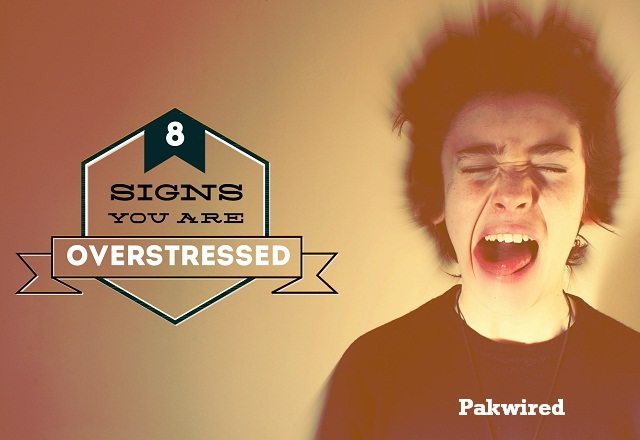Everyone experiences stress. To completely escape it, we’d have to put ourselves in a bubble and hide from life’s experiences. However, this wouldn’t actually work because as our worlds become smaller, our tolerance for stress decreases. What this means is: the more you hide, the more things there are for you to hide from.
Instead of hiding from stress or trying to plow through it, we must gradually learn to release it. This doesn’t occur all in one shot, rather it requires practice just like any other skill. Review these 8 signs to determine whether you’re overstressed.
You shake during stressful events
Shakiness is a very common sign of stress. Often our nervous system will kick in immediately at a perceived threat, even if it’s not physical. So if you often lapse into shakiness, you may have emotional fears or situations in your life that are causing too much stress. Low blood sugar, which is a kind of stress on the body, can also cause shaking.
You get butterflies a lot
Most people get butterflies before a speech or performance, but getting them regularly is a sign something is amiss. The best way to judge this is consider whether other people get butterflies or knots in their stomach for the same situations you do. Everyday scenarios like leaving the house, being around people, or having a lot to do at work should not cause nervousness on a consistent basis. Furthermore, if you notice that just thinking about certain problems starts to make your stomach knot, try to either resolve the problem or put it out of your mind (whichever is possible).
You cry easily in stressful situations
Crying helps lower our cortisol levels. Cortisol is commonly referred to as “the stress hormone,” or the hormone that helps us cope. If you often find that you break down during stressful times and cry very easily, this is a sign your cortisol levels are overwhelming you. If you feel better and calmer after crying, this is even more indicative that your cry was much-needed. So don’t hold back from crying when under a ton of stress; it’s actually your body’s way of helping you out.
You often have shoulder or neck tension
Some people still believe that mental and physical tension are unrelated, but the mind-body connection is not just some New Age jibberish. Prolonged mental tension translates to physical tension. Oftentimes, this manifests in the neck and shoulders because these areas are usually kept in stiff positions. If you spend all day at the office or in front of a computer, your neck and shoulders can remained tensed without you even noticing.
You startle easily in day-to-day life
Are you one of those people who jump out of their skin when someone jumps out at them jokingly? Even worse, does it take you a while to calm down from these minor stressors? Maybe you feel like you’re adrenaline is rushing and it takes you a minute to calm back down? This is a sign that your nervous system is a bit edgy. Some people don’t startle easily, and when they do, the scare is not as severe; they’re able to calm down again right away.
Another version of this is overreacting to minor occurrences. For example, if you spill something while cooking and immediately startle, become angry, or feel upset. These everyday occurrences should be easily dealt with. You shouldn’t be stressing over each inconsequential event or you will quickly tire out your nervous system- leading to the next potential complication.
Your blood pressure or heart rate is higher than normal
One of the most common medical signs of stress is chronic high blood pressure. There could always be other complicating factors, but our blood pressure typically rises during stress. So if you have sustained high blood pressure, that means your cortisol levels are higher than what is healthy. Cortisol should typically only rise in emergencies to help us deal with them.
When under serious stress, you can typically feel your heart racing. But when stress is less serious and prolonged, a consistently elevated heart rate may be hard to detect. This is something a doctor will be able to help you with, as normal heart rates vary by age, physical fitness, and other factors.
Sustained high blood pressure (and cortisol) puts you at risk for a slew of more serious problems like blood sugar imbalances, diabetes, weight gain, immune system dysfunction, insomnia, and more.
You lash out at people
If someone approaches you with a simple question or statement, lashing out is a sign that you already have too much stress built up. Likely, that person’s statement was a tipping point or “last straw.” Otherwise, you would’ve been able to deal with it casually.
So if you find yourself constantly short-tempered with people, find out what you’re really stressed about. It’s probably not just other people, but something much deeper. Taking your stress out on other people will only cause resentment for them and more stress for you.
You are deprived of fun
Yes, fun is something that adults are not only allowed to have- they kinda have to have it. Humans are not computers; we weren’t designed to be work machines. If you’ve stopped scheduling fun into your week, stress is inevitable.
We often push ourselves towards more and more productivity, but in reality, it’s breaks and fun that keep us consistently productive. Without these, we run out of steam. So schedule fun or relaxing activities. They’re not counterproductive to your productivity.
Conclusion
If you’re suppressing, ignoring, or forgetting stress, you’re not actually handling it. Handling stress requires intentional focus. You must actively provide yourself with relief through whatever practices work best for you. You’ll know whether it’s working by how you feel. Is your mind still racing? Is your body still tense? Gauge your success by how many of the above habits you manage to drop.


